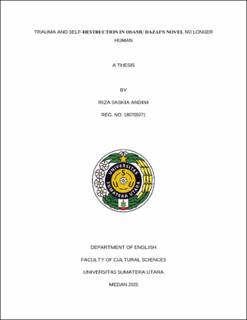Trauma and Self-Destruction in Osamu Dazai’s Novel No Longer Human

Date
2025Author
Andini, Riza Saskia
Advisor(s)
Syahputra, Fikry Prastya
Putri, Dian Marisha
Metadata
Show full item recordAbstract
This research investigated the portrayal of trauma and self-destruction in Osamu Dazai’s No Longer Human through a literary psychology lens, employing thematic analysis based on the framework of Ward, House, and Hamer. The study aims to examine how the protagonist, Ōba Yōzō, experiences psychological trauma and how these unresolved wounds manifest in patterns of self-destructive behavior. The analysis identifies key themes such as identity crisis, alienation, and emotional numbness by analyzing narrative elements and character development. Findings show that trauma in Yōzō’s life emerges from early emotional neglect, social isolation, and repeated feelings of inadequacy, which gradually erode his sense of self. These experiences lead to a cycle of destructive acts including substance abuse, attempted suicides, and detachment from human relationships. The research concludes that Dazai’s narrative offers a deeply introspective depiction of how trauma and existential despair can dismantle an individual’s psychological integrity. This study contributes to the understanding of mental health issues in literature and highlights the continuing relevance of No Longer Human in discussions of human suffering and identity.
Collections
- Undergraduate Theses [874]
